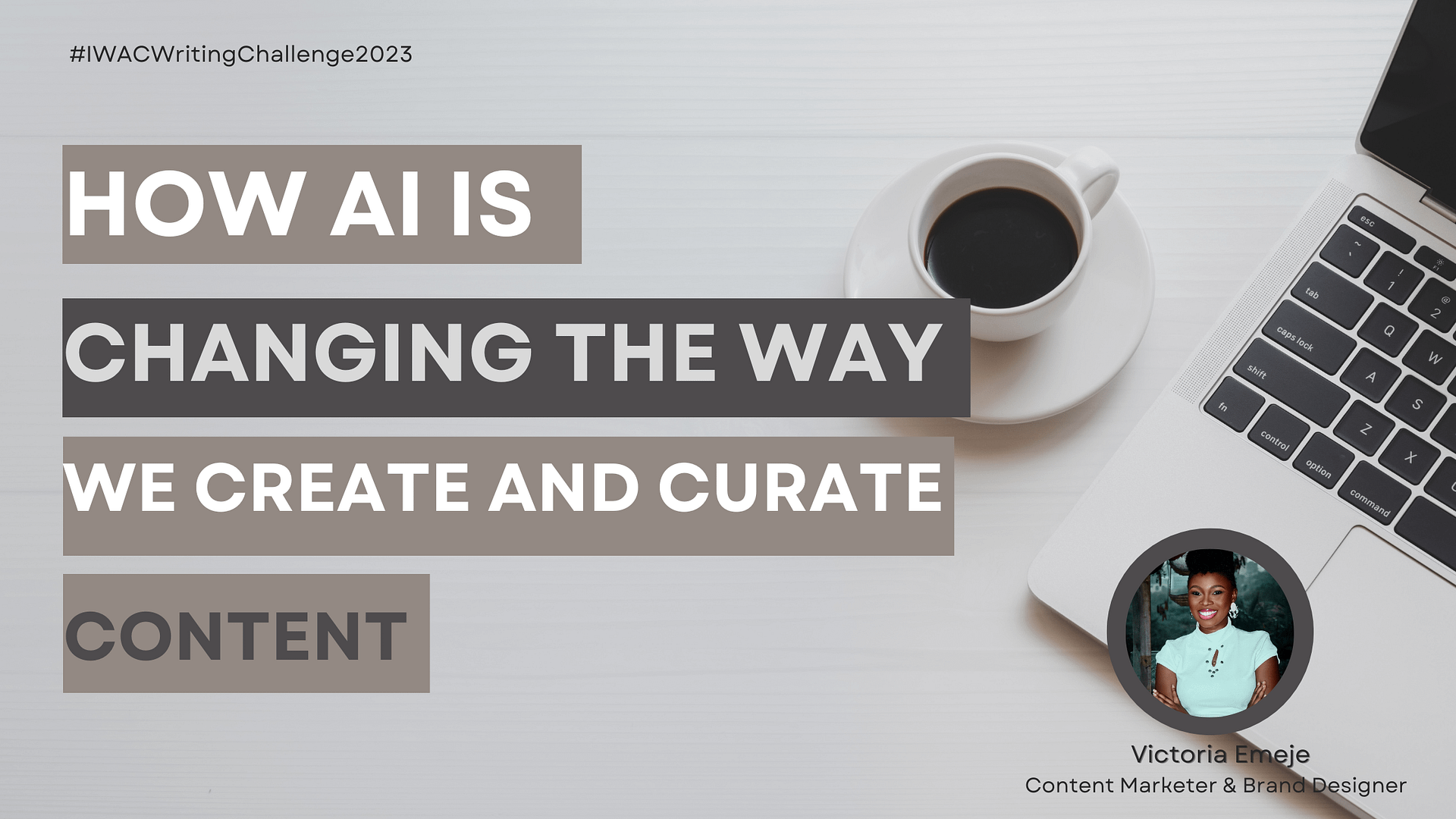How AI is Changing the Way We Create and Curate Content
Looking back at some decades ago, creating high quality content looked like this: grab a pen and notepad (or a PC for some people), scribble your title on it, brainstorm and write down what the outline should be, jot down the thoughts that come to mind as you brainstorm on the topic, gather resource materials to further expand your knowledge on the subject matter and serve as supporting information for your article or whatever content type, and finally, write the full copy and have someone review it. Depending on the depth of your knowledge on the subject matter and expertise, it may take you a day or two, or even a week or more, to have your final copy ready to publish to the public.
That process for writers or content creators generally seemed a bit daunting, as it requires a lot of time. It requires careful planning, strategic thinking, in-depth research and deployment of creativity. In recent years, the rapid advancement of Artificial Intelligence (AI) has altered various industries dramatically, and the field of content creation and curation is no exception.
AI-enabled technologies are profoundly impacting the way content is generated, curated, and shared with audiences globally. AI is now used to generate relevant and engaging content, automate tasks such as writing articles, designing graphics, and personalising recommendations, which helps users see the content that is most likely of interest to them. All these innovative changes have a significant impact on how we consume and interact with information.
In this post, we’ll explore the implications of AI in shaping the future of content creation and curation while unraveling ways AI has changed the way we curate and create content.
Positive Impact of AI on Content Creation and Curation
Streamlining Content Creation:
AI in recent times has shown to be a game-changer in content creation, streamlining the process and increasing efficiency. The content creation niche is a fast-paced and demanding field with a constant need to put out quality and consistent content. Several AI-powered writing tools, such as Jasper.ai, ChatGPT, Peppertype.ai, Copy.ai etc., are now available to users to meet this demand and ease the process.
With these generative AI tools, users can automatically generate content plans, blog posts, product descriptions, articles, and social media content based on specific prompts or topics they input. This not only saves valuable time for content creators but also allows them to focus on more creative aspects of content development. Interestingly, AI-generated content can serve specific niches, enabling businesses to target diverse audiences with tailored messages.
Enhancing Content Quality and Relevance:
AI algorithms typically analyse huge amounts of data and are able to deduce user behaviour. By analysing user interaction and engagement patterns, search habits/trends, and social media interactions, AI will come up with valuable insights on the type of content that resonates with specific audiences. As a result, content creators can produce more relevant and engaging material, improving the overall quality of the content and boosting audience satisfaction.
Personalising Content Experiences:
One of the most relevant impacts of AI on content curation is personalization. AI-backed content recommendation systems aid in delivering personalised content to individual users based on their preferences, browsing history, and interactions online. This ability to personalise content improves the user experience, increases users’ engagement, and fosters brand loyalty. For businesses, personalised content recommendations provide an opportunity to deliver targeted marketing messages, eventually translating to higher conversion rates. The best part is doing all these in a short time.
Curating Relevant and Diverse Content:
AI has also changed the content curation process of manually choosing valuable content from a variety of sources, rewriting it, and sharing with readers. AI-powered curation tools like feedly.com, scoop.it, quuu.co etc can efficiently sift through a large amount of available data from reliable sources online to identify and choose relevant content that resonates with your audience’s interests.
Whether it’s an article, video, podcast, or social media content, these tools can quickly and easily curate a list of resources a creator can use in creating content. This ensures that content curators can present diverse and insightful content pieces, establishing themselves as valuable sources of information and thought leaders in their respective fields.

Improving SEO and Search Visibility:
SEO is a critical aspect of content creation because you need your content to be visible to your target audience. Imagine spending hours or days creating content that, at the end of the day, is not seen by your target audience. Frustrating right? No worries. If you’ve not understood how to utilise SEO strategies in your content, AI tools will help you achieve that.
AI has become a key component in enhancing Search Engine Optimization (SEO) strategies. Here’s why. AI algorithms have the ability to analyse users’ search patterns, identify relevant keywords, and optimise content accordingly to rank higher on search engine results pages (SERP). By leveraging generative AI for SEO, content creators can increase their content’s visibility, attract better organic traffic, and reach a wider audience.
Mitigating Plagiarism and Copyright Infringement:
Plagiarism is a serious offense in the content space. It is okay to copy a quote, or paragraph and cite the author of the content, but doing so without referencing it destroys your integrity and credibility. In recent years, several plagiarism detection tools have been developed to identify plagiarism in a copy. While some are not so accurate, a handful of popular ones have been proven to be highly effective.
AI-driven plagiarism detection tools such as Turnitin, CopyLeaks, GPTRadar etc can quickly identify duplicate content and potential copyright infringements, allowing content creators to ensure the originality and authenticity of their work. This not only safeguards their reputation but also upholds ethical content practices.
Challenges and Ethical Considerations
Despite the various benefits of integrating AI in the content creation and curation processes, there exist some adverse challenges. Ethical considerations, such as the responsibility of verifying AI-generated content, remain critical. AI algorithms are prone to errors or biases, hence making it vital for individuals to check the content generated by these tools to avoid the potential risk of disseminating misinformation or biased content.
One of the challenges that also bedevils this beautiful technology is deepfake. Deepfake refers to an artificial picture or video created by an advanced type of machine learning known as “deep” learning. It is often difficult to tell if the images or videos are false or real. With deepfake technologies, society runs a high risk of exposure to misinformation, which can cause chaos.
Looking Ahead: The Future of AI in Content Creation and Curation
As AI technology continues to advance, we will see more interesting changes in the content space. We have big brands like Spotify, Adobe, Canva, Google, and others incorporating generative AI tools into their existing tools. At the moment, there are AI tools for generating lyrics, voiceovers, virtual DJs, photos, songs, and videos. The future of content creation and curation appears favourable.
We can expect even more sophisticated AI algorithms capable of generating highly creative and nuanced content in the coming years. This also means, AI-driven curation platforms will likely provide increasingly tailored content experiences, meeting the ever-changing preferences of global audiences.
Conclusion
AI has indeed made a profound impact on content creation and curation, transforming the way we develop and disseminate information. The seamless integration of AI technology enables content creators and curators to harness its potential, producing high-quality, personalised, and engaging content that resonates with audiences. As we embrace the AI-powered future, it is essential to strike a balance between technological assistance and human creativity to ensure the continued production of insightful and meaningful content in the years to come.
Follow to see my next post on: Pros and Cons of AI-Generated Content: Striking the Balance Between Efficiency and Authenticity When it is shared.
Are you a beginner at content writing? Get my eBook: Content Writing 1.0: The Ultimate Guide to Writing Stellar Content that Converts and Earns You Money Here: https://selar.co/6ilv
#Contestant007 #ContentWriting #IWACWritingChallenge2023 #Day1 #Post1
References
https://link.springer.com/article/10.1007/s11747-019-00696-0
